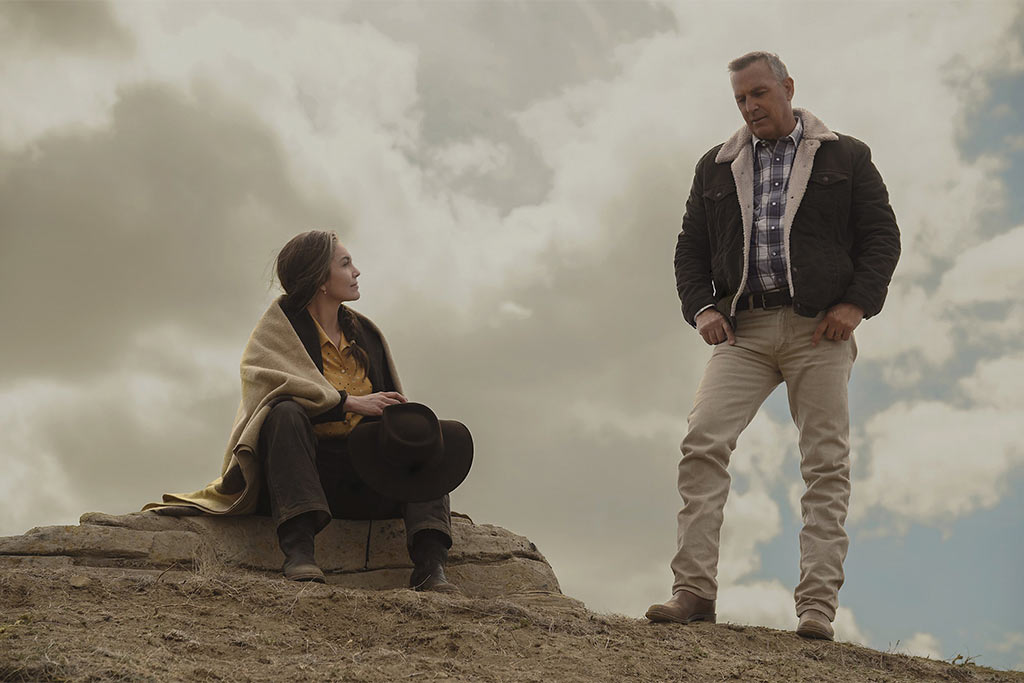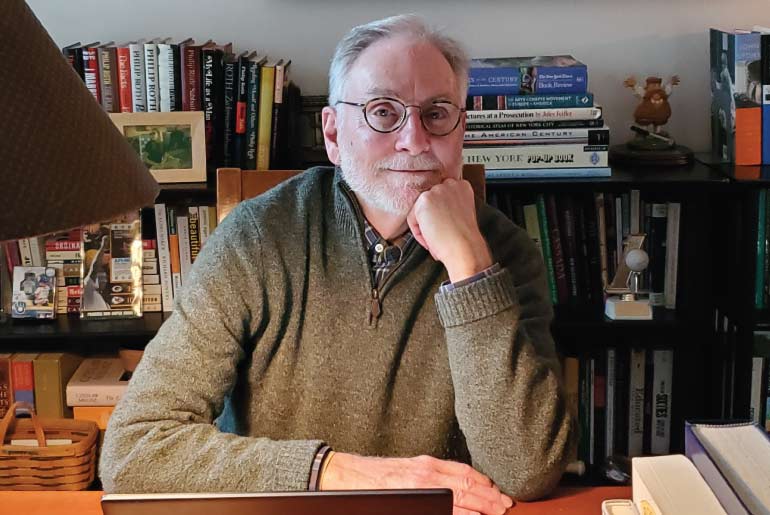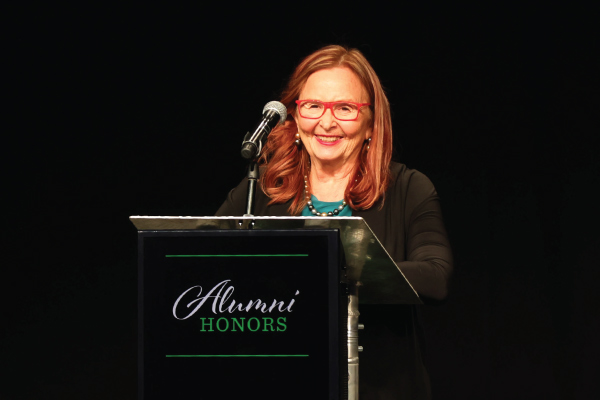The Lives of Larry Watson
Praised for his tales of the American West, best-selling author Larry Watson has a new book out as one of his previous novels hits the big screen.
North Dakota-born author Larry Watson, ’70, ’72, is having a banner year. Not only did his 12th book, “The Lives of Edie Pritchard” come out in July to critical acclaim, but a movie based on one of his previous works will be released later this year starring Kevin Costner and Diane Lane.
Like many of his books, “The Lives of Edie Pritchard” is set in North Dakota and Montana. The book’s jacket description says it is “a multigenerational story of the West told through the history of one woman trying to navigate life on her own terms.”
In its review, “Publishers Weekly” writes, “Like in the best works of Richard Ford and Elizabeth Strout, Watson shows off a keen eye for regional details, a pitch-perfect ear for dialogue, and an affinity for sharp characterization. This triptych is richly rewarding.”
Watson originally thought the book would focus on twin brothers falling in love with the same woman, but as it progressed Edie, a woman whose good looks define her, stood out to him as the protagonist.
“I just found her a fascinating character,” said Watson. “She was a small-town woman who was pretty and popular in high school and that sort of became her identity. She feels stifled by the fact that she just cannot assert an identity of her own apart from the way that others, men especially, see her. So all the parts of the novel [set in different times periods] are a part of that ongoing struggle in her life.”

Larry Watson's latest book is set in North Dakota.
NORTH DAKOTA ROOTS
Watson was born in Rugby, North Dakota. When he was five, his family moved to Bismarck, where he graduated high school and attended Bismarck Junior College (now Bismarck State College). After being out of school for a year and getting married to his high school girlfriend, Susan Gibbons, he came to the University of North Dakota where he would earn bachelor’s and master’s degrees in English.
“We loved our years in Grand Forks,” said Watson. “My time at UND was everything to me. I had wonderful classes. I had brilliant teachers. I was sort of awestruck for much of my time there. When I started taking creative writing classes, I got exactly the kind of encouragement I needed. ... It was a really important time in my development.”
While working on his doctorate at the University of Utah, Watson seemed to bypass the struggling author route when he found a publisher for his first novel, “In a Dark Time.”
“I'm embarrassed to say it; it was so easy that I was completely deceived about what the process was going to be like.”
Watson was working on the novel as his dissertation. He sent 50 pages off as part of a fellowship application. While he didn’t get the fellowship, one of the screeners had been an editor who was about to become a literary agent. He asked Watson for more pages, and eventually sold the book to a publisher.
“I got a modest advance and we really needed the money so it felt wonderful. I’d heard and read all those tales of agony and searching for an agent and a publisher and I barely had to lift a finger.”
Did he feel guilty that it had come so easily?
“No. Because, for the next 13 years, I could not get another novel published,” Watson said with a laugh. “I was living up to my part of the bargain—I was writing novels—but I could not find a publisher who was interested.”
THE BREAKTHROUGH
When his second book finally found a publisher, it was hailed as a major work. “Montana 1948: A Novel” was named “one of the top 100 novels of the West” by “San Francisco Chronicle” and “a significant and elegant addition to contemporary American fiction in general” by “The Washington Post.” Published in 1993, the book also won the Milkweed National Fiction Prize.
“I was simply relieved. I wasn’t sure I’d ever have another novel published. Not even in my wildest fantasies did I imagine that I’d have a book with the kind of success that that novel had.”
Though I’ve lived outside the state longer than I lived there, I will always be from North Dakota. It will always be a special place to me.Larry Watson
ADAPTED FOR THE SCREEN
Watson’s profile is about to expand further with the release of the movie “Let Him
Go” based on his 2013 novel of the same name.
The book and movie tell the story of George and Margaret Blackledge. After their adult son dies in a farm accident, they go in search of their only grandchild after his mother remarries into a troubling family.
The Blackledges travel from western North Dakota to eastern Montana in their quest, while in the movie the action moves in the opposite direction. Otherwise, the movie is quite faithful to the book.
Watson says that even though he was not involved in writing the screenplay, screenwriter/director Thomas Bezucha (“The Family Stone,” “Monte Carlo”) did seek his thoughts.
“He and I had some conversations over the years before the movie was made and I’d seen the script. I liked and trusted and respected him a lot. I thought he was so skilled at what he does, and since filmmaking is such a different medium from novel writing, I just said ‘Hey, I did my thing, I wrote the book, and now it’s your thing.’ I was able to separate myself.”
Larry and Susan got to visit the movie set in the Canadian province of Alberta last year. Director Bezucha even put them in a scene as extras.
Watson says it was surreal to hear his words spoken by famous actors on the set, although he was often unsure if they were his words or Bezucha’s.
“Once I’ve finished something I’m usually finished — it even begins to fade from my mind. ... So every once in a while, I would hear a line from Diane Lane or Kevin Costner and I didn’t know if I’d written it or not. It would sound familiar, but I wasn’t sure.”
Focus Features has moved back the release of “Let Him Go” from August to November 6.

Kevin Costner and Diane Lane star in an adaption of Larry Watson's book, "Let Him Go." Though filmed in Canada, the movie is set in North Dakota and Montana. (Photo courtesy of Focus Features)
THE WRITING PROCESS
Up until he retired in 2018, Watson was also a full-time English professor, first at the University of Wisconsin-Stevens Point and later at Marquette University. Watson said he would often tell his creative writing students that they were in this together.
“I would do the assignments myself so we could talk about them, and we could share our experiences of working on these sometimes difficult exercises.
Watson says he picked up a valuable tip when a visiting writer encouraged students to try to write at least 100 words a day.
“He said ‘If you can write 100 words a day, you can write a novel in a couple of years.’ Suddenly, it just seemed possible. It didn’t seem daunting. …You can fit 100 words on a postcard. Sometimes you only have 15 minutes, but 15 minutes can give you your 100.”
Most days, especially now that he is retired from teaching, Watson writes more than that. And as he writes, his imagination often has him setting his tales in his home state.
“I’ve been called a writer of the American West. I always thought I was writing ‘Northerns.’ Of course, there’s no such thing as a Northern … But I guess, at some point, I felt as though this was territory that I could claim. No one else had taken it over.
“Though I’ve lived outside the state longer than I lived there, I will always be from North Dakota. It will always be a special place to me.”




